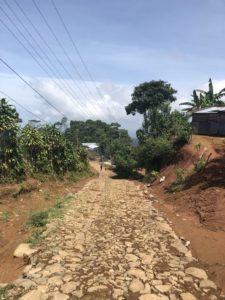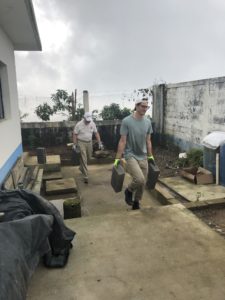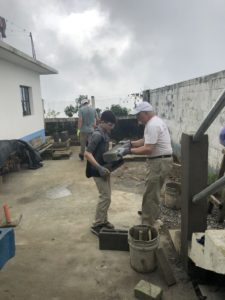Bridging the Gap: Volunteers Visit Curamericas Global’s Newest Casa Materna
Posted: September 11, 2019
Waking up to get a glass of water from the kitchen. Jumping in the car for a last-minute run to the grocery store. Rushing over to your local urgent care due to a spiked fever. These everyday tasks or happenings never stood out to 15-year-old John Wallace as “luxuries”. That is, not until he traveled with his mother and nearly a dozen other strangers to a remote village in the mountains of Guatemala.
For the likely small percentage of people who could pick out the Department of San Marcos on a map, they probably know more about the romantic parts of the area. It’s home to the country’s highest volcano and beautiful highland scenery. What many may not know is the everyday reality for much of the population, which is still greatly entrenched in the Mayan language and culture. With an elevation of nearly 8,000 feet, the people live in isolated, hard to reach areas, wherewomen and children are left with no healthcare options and often give birth on the dirt floors of their homes.
This is the reality that John and the group of volunteers he traveled with in July 2019 would soon discover. The volunteers included members of Fuquay-Varina Methodist Church in North Carolina, while others were healthcare workers from Baltimore, Maryland, who had various medical backgrounds that focus on women’s health and obstetrics. John was one of
the youngest of the group, and actually celebrated his fifteenth birthday while on the trip.
The group was brought together by the global health nonprofit, Curamericas Global. While many of the volunteers were familiar with Curamericas’ incredible mission, others like John were getting their first look at the impact this North Carolina-based organization is having on forgotten communities around the world.
Their destination for this trip was Curamericas’ newest Casa Materna (Casa) (a community-owned and operated clinic for women and children) in San Marcos, which only a few have traveled to. “The Casa has not even been open for two years,” said Jackie Wallace, John’s mother, and a health worker who has also traveled to Curamericas’ project site in Calhuitz, Guatemala. “They’re definitely still building bridges in the community.”
Curamericas Global’s mission is to partner with forgotten communities to save the lives of mothers and children. In partnership with the Guatemalan Ministry of Health, Curamericas runs five community-operated Casa Maternas, or birthing homes, throughout the rural highlands of northwestern Guatemala that are open 24-hours a day, seven days a week. Curamericas’ Casa Maternas are cultur
ally-adapted birthing facilities that provide Mayan women with medical care and support during their pregnancy, delivery and after the birth. Curamericas opened the doors to the facility in San Marcos in December 2017.
David Bell helped organize the trip to San Marcos and rallied many of his fellow church members to attend. This trip marked his ninth with Curamericas. David’s first trip dates back to 2001, when he visited the nonprofit’s project site in Bolivia. “We’ve done projects with the Methodist churches in the community, ” said David. “Usually we build [alongside community members] and work with the youth.”
The volunteers’ 10-day trip to San Marcos involved working alongside local health workers, conducting home visits and training seminars, helping build the dormitory and attending community events to provide valuable education and health services to the local population, as well as learning about the culture. While the volunteer health workers provided their expertise, the other volunteers served as a resource for construction, organization and companionship.

The volunteer group arrived to the Casa Materna following a long journey up the rocky mountainside, which included hours of torrential downpour. Upon arrival, the volunteers learned that construction was not complete in the volunteer dorms, so some of the women slept in the Casa Materna, right next to the delivery room. “Sleeping next to a room where someone is giving birth is quite an incredible experience,” said Tiffany Wagner, one of the volunteers from North Carolina.
During the team’s first night at the Casa, many of them were able to be part of a local mother’s birth. “That was really wonderful,” said Allie Bruns, a Maryland healthcare worker. “It was more of a backseat approach, compared to what I’m used to, but we were able to go in, hold the mother’s hand and witness the birth.” Allie remembered thanking the mother for allowing her to be a part of something so intimate in another culture. A memory she knows she will never forget. Allie’s experience came full circle, as she visited the same mother during one of her many home visits on the trip checking in on her post-natal care.
These visits provided Allie and the other volunteers an opportunity to see the Casa’s health workers day to day job. It typically starts with a long trek to the villages, where they go home to home, visiting families and educating mothers about water treatment, hand washing and proper nutrition. They also provide life-saving health tools, like vaccinations and vitamins for infants and children.
The home visits were eye-opening experiences for 18-year-old Eva Jane Burman. Just a few years prior, she had traveled to Bolivia and knew that she would be able to have significant time with the families, and most of all, the children. “I went on every home visit they offered,” she remembered.
The long journeys the team made to reach the communities were also ingrained in Eva Jane’s memory. “There were some days where we would hike several miles, up and down rocky paths, passing shacks and wandering animals, but my favorite home visit, we took a three-hour truck ride,” she said. “I remember my job was to play with the children and keep them entertained while the health workers tended to the mothers.”
Making this trip even more special for Eva Jane, she was able to enjoy many of her experiences with her own mother, Tiffany Wagner. Back home, Tiffany is a family therapist. She goes into families’ homes and makes sure they are connected to commu
Working for the Casa Maternas is a very competitive job in the community, as staff are well supported and compensated. There are currently four nurses and six support staff at the facility in San Marcos. Although the shifts rotate, the Casa Materna is manned 24 hours a day, so the health workers can attend births, collect data and perform training sessions for the dozens of volunteers from across various communities.
The volunteers worked side-by-side with the health workers, who were also responsible for cooking their meals while they were there. Many of the volunteers were inspired by all the health workers took on to help the communities. “They have t
o tend to their patients, but they also have to tend to us,” said group leader, David Bell. “They know what they’re doing has value and meaning, and it’s important for us to be there — it encourages the workers and we bring life-saving supplies, like vitamins and vaccines.”
The appreciation was also seen through the eyes of John, the youngest volunteer on the trip. “Everybody in this small town knew we were there to help,” said John. “They knew the work we were doing, and even though I’m not a medical worker, they knew I was helping them in some way, they were

John, along with group leader David, assisted with the construction that was happening inside the volunteer dormitory. Their days consisted of moving heavy cinder blocks to the construction site, so the builders could have easy access to them. Although John wasn’t involved in the day-to-day home visits, or hustle of the Casa Materna, the importance of the work being done was clearly evident. “The Casa Materna was small, but so powerful,” John remembered. “People would come there every day, asking for help, whether it was training, needing healthcare or delivering a baby.”
What made this trip even more impactful for John was the opportunity to watch his mother on the front lines, helping women give birth to their precious children. Jackie Wallace is an OBGYN physician in Baltimore, Maryland. She worked mostly in the Casa Materna, training the healthcare workers and even assisting in the patient visits. “The work that I witnessed her take on, it made me truly understand how difficult it is and how good she is at her job,” said John. “It was incredible to see the impact she had on these women.”
Along with health visits, training sessions and construction, one volunteer helped educate local leaders about the community’s water source. Dave Heiser, the Water Consultant on the Curamericas Global Board of Advisors, was among the volunteers on the trip.
During the trip, Dave met with 25 villagers, men and women, who were plumbers and water committee members from the area. They talked to Dave about some of the issues they had been faced with, and even took him to one of the problem areas. As soon as he saw the location, Dave knew it was wastewater related. “They have an immaculately clean drinking water access, but there was a wastewater pipe right next to the spring box for the water systems,” Dave recalled. “I explained they needed to get that pipe removed from the river.” Dave is already making plans to return to the Casa next year to continue to assess their system.
This education piece is just one part of Curamericas Global’s critical approach to help create sustainable programs for the communities it partners with. Developed by Curamericas’ founder, Dr. Henry Perry and Dr. John Wyon, the Community-Based, Impact-Oriented methodology is an approach that allows healthcare providers to better understand, more effectively treat and accurately measure outcomes and impacts for the most commonly found causes of unnecessary suffering, sickness and death within communities. Access to clean water can contribute to many of these avoidable, and often treatable, illnesses.
This approach is key for Curamericas, because it ensures that its programs and services are meeting the needs of every person in each community. No one is forgotten. “From observing in Bolivia, as well as Guatemala, it’s the best solution there is,” said David Bell. “These families are cut off physically, geographically, socially due to ethnicity. Curamericas’ approach is meeting their needs in the best way, teaching and educating so they can improve their well-being for generations to come.”
It is this approach that truly sets Curamericas Global apart from other organizations. It saves vulnerable women and children by establishing local partnerships and delivering effective, self-sustained programs that respond to clear needs and gaps in the community. Since 1983, Curamericas Global has reached over 1.4 million people in seven countries, including the United States. They have external evaluations that show reductions of mortality in children and in mothers, literally saving thousands of lives.
Community members also play an active role in the health and success of their neighbors by becoming Community Health Volunteers. Curamericas Global staff train these local volunteers, often local mothers, to work alongside healthcare providers so they can help educate other women in their community. These volunteers are the eyes and ears of the project. “Having the community be the primary investor in the project is a game-changer,” said Allie. “They employ all local people, and they’re all trained. It’s unparalleled in approach – without that investment in themselves, you’re never going to become sustainable.”
To help achieve this goal of sustainability, Curamericas and the San Marcos government have set goals for the project. They include increasing health facility deliveries, decreasing maternal mortality, achieving an overall improvement in maternal and child health indicators, improving psycho-status of the population and increasing community trust and involvement in the formal health system. “It’s our goal that every mother and child, in every community receive services,” said Andrew Herrera, Executive Director of Curamericas Global. “No one is forgotten, and no one is left behind, because Curamericas Global goes to them.”
If you or a group are interested in a rewarding traveling and volunteering opportunity with Curamericas Global, please contact us at [email protected].
Donations are needed today to help save lives. For every dollar donated, we are able to create seven dollars of matching from partners. Donating $28 today will provide comprehensive healthcare for a mother and her family for an entire year. www.curamericas.org/Donate
Share this Article
Stay Up-To-Date With Curamericas Global
We will not spam, sell or otherwise misuse your information!
